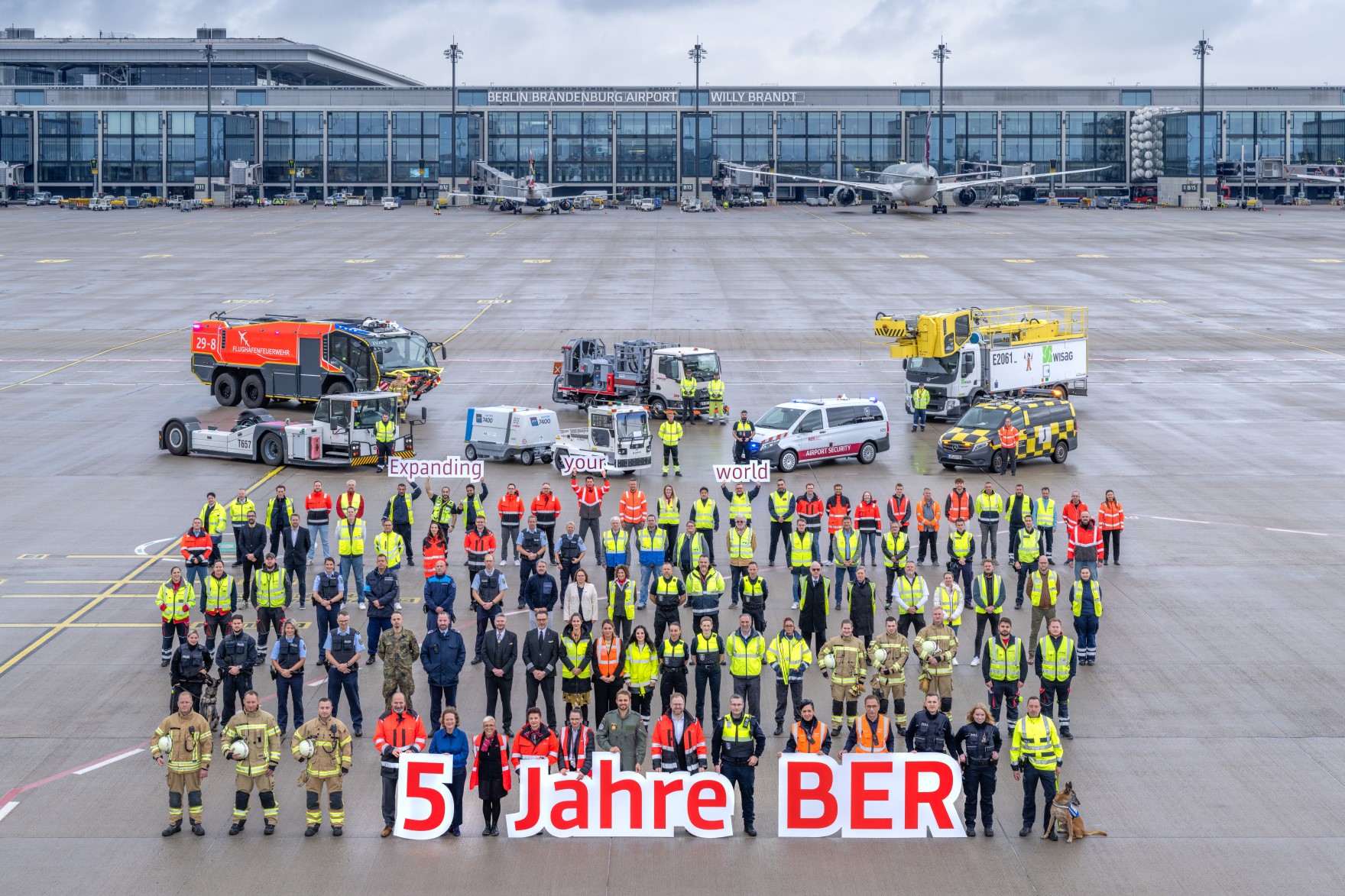Five years of BER: digital progress and more service for all passengers
More than 100 million people have used Berlin Brandenburg Airport
Five years after opening, Berlin Brandenburg Airport (BER) is reporting positive results. Since Terminal 1 went into operation on 31 October 2020, BER has been successfully developed into an efficient, high-performance and future-oriented airport for the capital region. The southern runway opened on 4 November 2020, while Terminal 2 went into operation in March 2022.
“We have achieved a great deal,” says Aletta von Massenbach, Chief Executive Officer of Flughafen Berlin Brandenburg GmbH. “BER has been generating operating profits since 2022 and is well on its way to financial independence. We are a powerful partner for airlines and have continually expanded the route network in cooperation with them. During the past five years, we have further expanded our services for our passengers, making their journeys easier, more comfortable and safer with innovative solutions. The recent cyberattack on our external software partner Collins Aerospace on 19 September 2025 clearly demonstrated that, thanks to the good cooperation between all partners, BER is able to react quickly and remain operational even in challenging times.”
High traffic, extensive network
Since the opening of Terminal 1 at Berlin Brandenburg Airport “Willy Brandt” on 31 October 2020, 100 million passengers have used BER, with 25.5 million travelling through the airport last year. In total, more than 800,000 aircraft have taken off and landed at BER in the last five years. Approximately 50 million pieces of luggage and 200,000 tonnes of freight were loaded. Friday, 17 October 2025 was the busiest day to date. At the start of the autumn holidays in Berlin and Brandenburg, more than 100,000 passengers travelled through Berlin Brandenburg Airport in a single day for the first time.
Today, 70 airlines connect the Berlin Brandenburg region with 150 destinations around the world. The most popular destinations are the Mediterranean regions, but also long-haul destinations such as New York and Toronto. In recent years, connections to the Gulf region, in particular, have been expanded. In addition to new destinations such as Dubai and Jeddah, Qatar has increased its daily flights to Doha. From November 2025, Abu Dhabi will be added as a new destination. Furthermore, Beijing is now flown five times a week throughout the year.
Air traffic is a crucial factor for the region’s economy, which has developed rapidly. The airport environment is now a booming economic area with above-average employment growth. More than 20,000 people are employed at the BER campus alone, some 2,000 of whom are employees of the airport company.
Digitalisation and service quality
During the past five years, BER has continually invested in modernising its infrastructure and services for its customers. Today, passengers can largely arrange their stay at the airport in line with their own needs. This ranges from self-service check-in, self-service baggage drop-off and modern security checks to high-quality services in the shop and restaurant areas.
BER Runway (time slots for security checks), BER Biometrics (access via facial recognition) and more than 120 self-service machines for check-in and baggage drop-off have made the stay much more comfortable for travellers. 20 airlines already offer independent baggage drop-off.
At the beginning of 2024, FBB took over responsibility for managing security checks at BER from the German Federal Police. This was the first step towards optimising the security lanes. The two terminals were gradually equipped with new CT scanners. Today, 24 modern devices in both terminals enable swift security checks, which are already used by two-thirds of all passengers.
BER is also setting standards on the apron: the handling processes are monitored by an intelligent system introduced by FBB in 2024 – making BER one of the first airports worldwide and the first in Germany to do so. Live cameras and AI-based software enable the handling of aircraft to be analysed and controlled in real time.
Sustainability as an integral part of the corporate strategy
FBB is consistently pursuing sustainable airport operations at BER and has already reduced its own CO₂ emissions by about 50 percent compared to the base year 2010. Since spring 2025, three photovoltaic systems on the car parks have been supplying renewable electricity. Further systems on roofs and open spaces are planned by 2030. The conversion to energy-efficient LED technology saves more than one million kWh of electricity per year in Terminal 1 alone. Since 2024, FBB has been certified at Level 3 of the Airport Carbon Accreditation for its climate protection activities.
BER has received several international awards for its development:
- “World’s Most Improved Airport” (2025, Skytrax)
- “4 Star Airport” Rating (2025, Skytrax)
- “Airport Innovation Award 2023” for digital services and AI-based processes
- Outstanding Security Performance Award (OSPA) for excellent security standards (2025)
Image material from five years of BER can be found in our media library:
An overview of BER’s history can be found here:
Facts and figures are available for download here:

When using the image, please ensure that the source is correctly cited: © Günter Wicker / Flughafen Berlin Brandenburg GmbH
Flughafen Berlin Brandenburg
Operating Area BER North
Willy-Brandt-Straße 1
12529 Schönefeld

